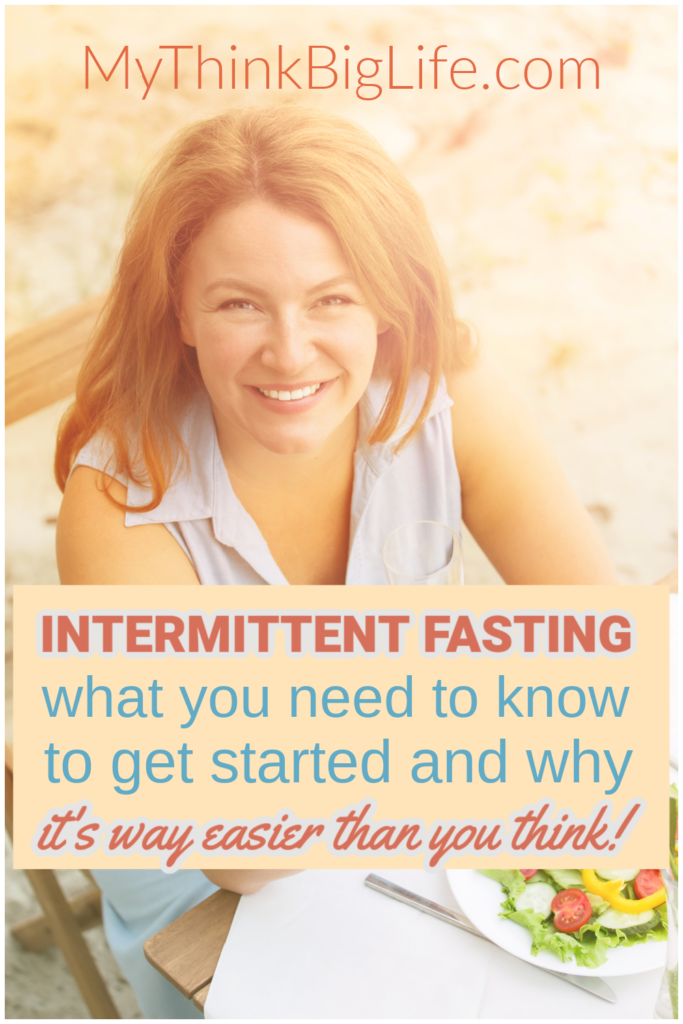How to Get Started with Intermittent Fasting
I’m going to share how to get started with intermittent fasting because it is one of my favorite tools for easily maintaining my weight. Intermittent fasting is very easy, good for you, and can assist with reaching your health goals.
I am a huge fan of intermittent fasting! It changed my life because I had been a few sizes bigger for years and was convinced that my body would never change.
The Benefits of Intermittent Fasting
First I want you to know why it’s good for you.
- It automatically lowers your calorie intake
- Decreases appetite
- Improves concentration (this was HUGE for me)
- It allows your body to digest your food and burn fat more efficiently
- Allows better blood sugar control
- Can reduce inflammation
- Helps with weight loss
- Can help regulate the hormones that direct fat metabolism, hunger, and satiety.
To be clear, this isn’t a magic way to get skinny or get a body that you aren’t genetically programmed for. But it can definitely help with weight loss or maintaining a comfortable weight.
August 2023 Update: I’ve been using intermittent fasting for about eight years now. I discovered it by accident before I had ever heard about it. In fact, I was writing about it before I even knew it had a name.
My experience is that I have more focus and energy when I don’t eat breakfast first thing. My body just feels better, having a break from eating.
I actually discovered the benefits of intermittent fasting long before it was commonly known. I lost weight without trying and I had to go back and figure out why that was.
I just knew that I had lucked upon a way that was helping me lose weight. I was eating light at dinner and not eating until breakfast the next day. So for many years, I wrote about this–without knowing it was a thing with a name!
Intermittent fasting is an easy way to help with weight management. It’s not a diet; it simply integrates a period of not eating into your day in a way that can help you lose weight.
Because of the studies I was reading, I was really curious. I already knew that not eating at night was helpful but I wondered if going for a longer period of time would help.
New research seems to be coming out daily on how good regular fasting can be for our body! Despite the name, all of us naturally fast for a period of time while sleeping.
My suggestion is to simply not eat after dinner and wait until you feel hungry before you eat the next day.
You can get good results with intermittent fasting or time-restricted eating too. It provides many of the benefits without the feeling of deprivation.
This may not be for you if you have any of the following situations. Please check with your doctor first!
- You are already underweight
- You are pregnant or nursing
- You have a history of disordered eating
- You do intense physical activity
- You are under intense periods of stress
- You’ve been diagnosed with a heart condition
- You have a blood sugar imbalance (such as hypoglycemia or diabetes) and feel faint when you don’t eat
When I fast, I really like how I feel when I don’t eat all day long! I concentrate on eating real food and in quantities where I don’t get uncomfortable hungry.
I talk more about hunger in this post. But in general, hunger is NOT a problem with this type of fasting.

I’ve written over 40 posts on how to lose weight after 50! I’m excited to share a new page, where I’ve pulled my favorite posts and put them into an order that you can use to get started. Check out my GUIDE TO LOSING WEIGHT AFTER 50.
My Early Experience with Intermittent Fasting
Seven years ago, I lost quite a bit of weight without really trying. I was on my own, newly divorced, and not cooking a lot.
About a year after I lost the weight, I wrote about the experience here and I thought I had figured out the reason why I lost the pounds effortlessly. I knew it had something to do with not eating at night until late the next morning.
At that time, I didn’t have a name for it, but I’ve referred to it in every post I’ve written since about losing weight. Now I know it’s called intermittent fasting or time restricted eating.
If you are like me, anything with the word fasting in it sounds scary. But I started doing it without knowing what it was, much less that it was healthy too. As it turns out, fasting is actually great for your health.
While, I didn’t know it this at first, fasting is good for you. Most people eat way too often, all day long.
However, I really didn’t understand how healthy, not eating for longer periods daily was. At first, I was just happy that it helped me manage my weight because I also knew that diets simply did not work.
Will I get hungry with Intermittent Fasting?
I hope so! Our natural hunger (not hangry) is so good for us. It is a signal that your body is ready to eat again.
But no, you will not feel uncomfortable otherwise. Your body will get used to this if you have a balanced and filling dinner.
If you eat the right kinds of food you won’t feel that awful kind of hunger that comes from eating low calorie food. My body actually prefers to eat this way now!
I think it’s also been really good for my skin too. People keep asking what I’m doing. Fasting, bone broth, and plenty of healthy fats!
The secret is that you have to eat enough at meals to not get hungry. That is not as much as you probably think it is either.
I advise my clients to add extra vegetables and healthy fat and oils to their lunch and dinner. Once your body starts using its own fat for energy, you really will not get hungry.
In fact, a little hunger will actually begin to feel GREAT. You’ll learn that hunger isn’t an unpleasant feeling. It truly feels good when it comes on naturally.
Why Diets Don’t Work
Diets really don’t work in the long-term, though most can facilitate short-term weight loss. Most people I know attempt to eat healthy. But most are still eating with bad information.
Low-fat, high carb eating is really bad. Eating, processed and fast food is bad for you. Sugar and foods that act like sugar are bad for you. Artificial sweeteners are bad for you. Oils like canola or corn oil are bad for you.
These types of food are not good in any quantity. Yet, these are still recommended for weight loss and health.
I feel confident that you will never ever suffer any type of health problem by giving up any of those foods.
Why? Because they are horrible foods that cause horrible consequences.
Yet, eating the right kinds of foods isn’t always enough to reverse our weight gain and fat storage.
It is a step in the right direction and eating good food that nourishes the body is necessary. However, there is a piece to the puzzle that is overlooked.
It’s not a diet; it is a way of timing the eating of your meals and it is about as easy a way to manage your eating as anything I’ve ever tried. It’s called intermittent fasting or time restricted eating.
What is Intermittent Fasting?
Don’t let the name scare you. All intermittent fasting means is that you are going for a period of time without eating.
In simple terms, think of it this way. You finish dinner at 7PM. If you don’t eat until 7 AM, you’ve fasted for 12 hours.
That is why breakfast is BREAK-FAST. You have fasted, and you are breaking it in the morning. Going 12 hours is pretty simple and easy. Most of us do that without even trying.
What research and real-life anecdotal stories are telling us, is that fasting used consistently and on a regular basis works.
Not only that, but it appears that the weight lost with intermittent fasting is fat and not muscle. Instead of making us weaker, intermittent fasting makes us stronger and leaner.

Why I Love Intermittent Fasting
- It’s EASY
- You feel better
- It works!
How to Get Started with Intermittent Fasting
First of all, we fast all the time when we sleep. Sleeping seems to be the only thing that keeps us from eating these days! If you don’t eat in the evening, then your fast is even longer and that’s a good thing.
To get started, don’t eat for 12 hours. Don’t eat after dinner! If you finish eating at 6PM, then don’t eat until 6AM. If you are used to snacking at night, that’s the first thing to work on. Quit snacking!!!
If you find yourself getting hungry in the evening, you probably are not eating enough of the right kinds of food. Good quality proteins, vegetables, and plenty of healthy fats will get you through the evening and night.
If you eat a lot of processed carbs you may find yourself craving more in the evening. Learn to eat real food that keeps you full and satisfied.
I’ve found it’s very easy to do a basic 12-hour fast. Even if I finish eating at eight PM, it’s easy to make it to eight AM.
However, most recommendations are for 14 to 16-hour fasts. So, I work at eating earlier and pushing my first meal of the day back.
If I finish eating at 7PM, then I don’t eat until 10 AM. I do have coffee, tea, or bone broth.
If you drink black coffee or tea—then that’s perfect. You can have those in the morning.
For me, a 12-hour fast works fine for maintenance. After a weekend with too much eating out, I will do longer fasts for a few days.
Why is Intermittent Fasting Good for You?
Your body needs this break in eating. It allows so many healthy things to take place. Fasting during the night and morning actually allows your body to heal much more effectively than by medication or even diet.
It helps heal insulin resistance. When you fast on a regular basis, you lower your insulin levels, and this improves your insulin sensitivity.
Insulin is THE hormone that regulates our weight and fat storage. It is critical that it be able to work well in your body.
What kills your insulin sensitivity? Eating the wrong kinds of food, all day long, day after day.
If you eat every few hours, your insulin is always up. Eventually, it is unable to do its job correctly and you get fat and even worse, you may get diabetes.
Unexpected Benefits of Intermittent Fasting
There are several things that I like about fasting. I feel more alert in the morning and I have more time since I’m not worried about trying to fix and eat a meal first thing.
I often get up, have coffee, do a little reading or working on the computer before I go to work.
If I’m doing a longer fast, then I don’t have to worry about lunch either. I’ve found that I am more energetic and alert when I’m not eating. Even healthy foods can cause that energetic slump we often feel in the afternoon.
Is it Hard to do Intermittent Fasting?
Not at all, especially if you are doing 12 or 14-hour fasts. These are easy because a very natural schedule for our bodies. Finish eating by 6PM and you can eat breakfast at 8AM.
You might feel a little hunger, but it shouldn’t be out-of-control, and it will come and go. In fact, feeling a little hunger feels good. It helps you appreciate your first meal of the day.
Is Intermittent Fasting Safe?
From everything I have read, it seems very safe. Like I said before, we naturally fast at night. But if you have any doubts about whether is is safe for you–check with your doctor.
All you are doing to improve your fat-burning and body healing functions is extending the fast to give your body more time to get into the fat-burning and healing modes. This usually takes 10-12 hours to get started.
Ideally, you are still eating plenty of healthy nourishing foods during the period of day when you are eating.
While I discovered intermittent fasting by accident, I have stuck to it by intention.
Now mainstream doctors and health studies are praising its benefits. It might seem to be the newest diet fad of the day, but I believe that it is more than just a fad. In fact just this past week, the Wall Street Journal had a big article claiming that it was REAL not a fad.
I just finished a book called the Obesity Code and this book claims that intermittent fasting might be the only way to reverse obesity too.
But as I mentioned at the beginning of this post, intermittent fasting is not safe for every person, so check with your doctor first.
My Experience with Intermittent Fasting
I like to make things as easy as possible!
Intermittent fasting is no exception. There are entire books on the subject that have complicated patterns of fasting.
I am not that kind of faster!
My body knows exactly when it is time to eat and I know that because it lets me know by being hungry. I don’t go rushing to my food at the first hint of hunger.
I like to let my hunger grow a bit. If hunger were on a scale of 1 to 10, I like to let it get to a 4 or 5, above a hint of hunger but well below being seriously uncomfortable.
For me, 12 hours is no big deal at all. Usually I start feeling hungry between 12 and 15 hours.
Most days I break my fast a bit by having coffee with half and half. Then I have a real meal for lunch and dinner. Then that is it for the day.
That might not sound like a lot but I probably include more protein, healthy fats, and vegetables in day compared to people that rely on snacks and convenience foods.
I really try to work with my body by not eating until I feel hungry and by stopping when I feel full.
If I do get hungry in between lunch and dinner, I will have a snack. This isn’t an endurance test–it’s just a way to optimize my eating.

How to Get Started with Intermittent Fasting
For me the easiest way to start was to start with 12-hour fasts. This is almost effortless when you go from your last meal of the day to your first of the next. My best results come from having a 15 to 18 hour fast.
In the morning, plain water, coffee, tea, or even a broth can help you extend your fast and keep you comfortable until your first meal.
The best way to know if this works is to give it a try for a few weeks. If you have a special night out, don’t sweat it too much. I found if I stick to this way of eating most days, then I can enjoy a late dinner now and then.
It might sound a little daunting at first, but since you are already fasting each night, it’s just a matter of getting more deliberate and intentional about the length of your fast. Good luck and let me know how it goes.
Keep showing up my friends,
Sara
Ready to find out more?
Schedule a free consultation today.
6 Comments
Leave a Comment
Coach with Me!

Hi, I'm Sara Garska and I'm so happy you're here! Big changes can happen with a shift in thinking. Over time, you transform your life into the one you always dreamed of having. As a certified life coach, I can help you create a life you love. Visit my life coaching page here.

How many days a week do you do this? Or is it every day? Thank you!
Hi Jill,
I do my intermittent fasting every day to some extent. I like to have a minimum of 12 hours between my dinner and first meal of the next day. When I’m trying to lose weight, I will have a 15 to 16 hour fast. It’s fairly easy since I don’t eat after dinner and then I sleep through a big part of it.
Thanks for the great information. I started intermittent fasting but was wondering if it’s ok to drink liquids after dinner or of the fasting includes both food and liquids?
Hi Dona,
When I intermittent fast, I have water, tea, black coffee, or infused water–all no calorie liquids. I don’t recommend anything that is artificially sweetened though. Good question! Thanks
I have truly enjoyed your page I had a question can you have fruit during an intermittent fast if so what kind of fruit is ok . Thanks
You don’t eat anything during the fasting period. Fruit is fine to have with your meals. Berries are always good. If you are just having one piece of fruit with a meal, then have whatever you enjoy.